
|

Also includes Tracking the Parrots"
and "What Survives." "Sentry" is a
couplet sonnet with slant rhyme.
|
|
Sentry
I heard them first--their quirky squawks--before
I saw the parrots. Green as jungles, fresh
as spring desire, their feathers rich and brash,
so unforeseen, I did a double-take.
So green on green, it took a stroke of luck
to spot these three among the leaves, but then
the telltale beaks, the doll-like eyes, the din
of vibrant colors. Where'd they been the last
ten months? And could I possibly have missed
such flash each day? I savor the moment,
aware it might soon fly away. I want
to turn virescent: blend into the green
as long as time allows. To stand alone,
remain a hidden sentry, wait for more.
|

|

|
|
Skimming the Surface
after Untitled (Blue Divided by Blue)
by Mark Rothko
Thin white lines curl toward shore across blues without the consistency of rhythm. A lake of intermittent memories. He sounds lucid enough when I call, just sad, as I imagine anyone who's lost a spouse would. Waves lift up, tilt down, undercurrents from nine decades of existence. Deep waters to draw from in this selective lake where bad memories have sunk, at rest in the unreachable mud and muck.
Over the months, he repeats several times how he and my mother never once fought. I know better, recall covering my ears with my palms in a dark closet as they screamed at each other. Better calm waves than crashing ones, better lonely than angry, so I don't contradict him. Let him believe what he wants. He repeats stories, tiresome as waves. In truth, I've had more conversations with my father than I ever had before my mother's passing.
Until my sister's call, I never deemed anything amiss. Suddenly I hear about maggots overtaking his kitchen, foreclosure notices, unpaid utilities, unwashed dishes, soiled clothing. Waves of disconnect between the lonely man I walk with on the phone and the one my brothers and sister experience. Crashing waves, the white gap widens.
pull
of the undertow
further offshore
|

|

All proceeds support relief efforts
for those affected by Hurricane Helene.
|
|
|
books embedded
with sand and grit
tornado-forced
sunlight
where trees once stood
our new view
|

|

|
|
Algorithms of Memories
golden shovel based on a Buson haiku
I don't remember what colors came before,
just the dazzling gleam of this watermelon sunset.
I don't remember which warbler sang so brightly,
only which love of many endures and shines.
I don't remember June's heavenly spectacle, but the
blue pulse persists from a single welcoming star.
And I will never forget the enthusiastic caress of a
baby's palm on my grandmother's fingers, withered
grasses, that soft shaft of white on a hard old field.
|

|

A Korean form!
|
|
Sijo for the Albuquerque Seasons
Fragrant fall, when cottonwoods release colors, cushion the earth
in leavings, a sweet perfume with every step in the forest,
food for worms in the detritus--how we forget death below.
**
Stiff winter, cold without snow, in windy skies a single flake,
white and sheer, light and lonely, like a whisper with a mission,
a brief life before it departs, so delicate, radiant.
**
Rainless spring, tempest of dust in from the west, dark walls of winds
pouring in--hear the whistle through the branches, a mocking scratch
dry as sand that lodges in throats, no oases, just sere tease.
**
Soft summer, the gentle hints of sweet breezes, honeysuckle,
and strangers open to love or sacrifice, to blossoming
into arms like constellations, laden with scents too soon spent.
|

|

A massive two-volume set!
|
|
Speaking to the Snake
I only stayed for the children.
Layered in too many clothes,
I wanted to take off
everything, down to the bone.
I longed for solitude, far
from husbands, lovers,
kids--but I told no one.
Deserts beckoned, promising
meaning in emptiness,
if only I could go there,
but I stayed, I stayed,
my mouth stuffed with Eden.
|

|

|
|
Compartmentalization of Memory
after 100 Untitled Works in Mill Aluminum
by Donald Judd (1982-86)
An ample space. Tiers of windows allow both sun and shadow, refractions and reflections. Hours of contemplation in this installation
where memories are stored. One hundred shimmering boxes, each looking like every other, but no two the same. Synapses reverberate from music, novels, classrooms, hikes, lovers, television--bound from one mirrored surface to another. Vertically, horizontally, diagonally. Too fast to track: the touch of a slim hand, the scent of a winter tangerine, the taste of a bloodied lip. They're all here, and billions more, though many lost in a nanosecond, ricocheting among the boxes. Constant changes, endless angles, and invisible variations are the norm. You can only guess what exactly you see or hear, what you
feel or dream. What you might miss in this infinite space.
|

|

|
|
|
mariposa syllables flit out of my mouth
|

|

|
|
Midwest Corn Roast
Old cinder blocks held up
a row of four twin bedsprings,
high enough that a rake
could distribute the hot coals
under each three- by six-foot space.
On the springs were dozens
of ears of corn, soaked in trash cans
of water overnights, silks removed,
husks tightly rewrapped.
Local farmers and veterans
monitored the roasting corn,
adding, turning, removing them
with long-handled shovels
in between sips of Schlitz.
Corn fields and stands abounded,
a baker's dozen for a dollar,
so corn was served at supper
all summer long--but boiled,
served with bright yellow pronged
holders shaped like mini-cobs.
Roasting was special,
stripped back husks provided
a means to grip, revealing
slightly browned, sometimes charred
niblets at their sweetest--no need
for butter or salt, though most folks
added plenty of both.
Boys would dare each other
to see who could eat the most ears.
Some ate "typewriter style," the length
of a row and back; some ate
"beaver style," round and round the cob,
teeth gnashing a third at a time.
The unspoken rule? No leaving
any niblet on the cob, not even
the baby ones near the silk end.
Most boys had not yet heard
of Vietnam, though some would
soon come back in boxes from there.
Other boys would move
as far from Illinois as they could,
but most would stay, and some
would become the men roasting corn
over bedsprings for a new generation,
not a one as innocent as these.
|

|
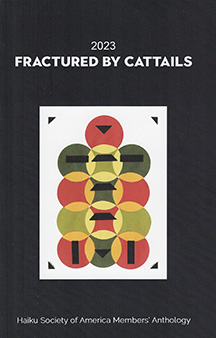
Featuring my collage, "Totem,"
on the cover!
|
|
|
the air within
and without you
bamboo flute
|

|
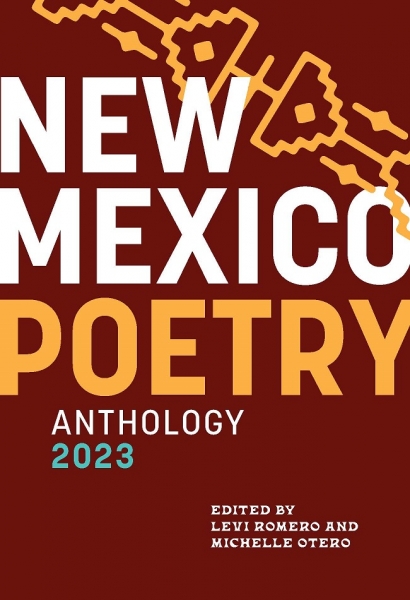
A rhymed series (not haiku)
written in syllabics of 5-7-5.
|
|
Río Grande, Somewhere Below
river-fog or smoke
you could be either on this
spent daydream evoked
in gray when I miss
the clarity of vision
the ghost of a kiss
are you a lesion
on this bleak skin of landscape
this former ocean
reduced to a shape
that slithers through the desert
a receding map
I gaze out inert
at the mesa I stand on
you could be fire, dirt
liquid, air, a con
how much time before you're gone
|
|
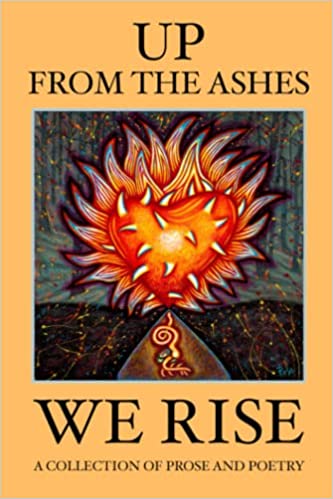
Forty writers respond to last season's
Hermit's Peak/Calf Canyon fires,
including my sonnet in persona.
|
|
What Survives
The outhouse burned. Fenceposts lit up like flares.
But prayers and hoses spared our home, thank God,
while all around the fire seethed in a dare.
We reeked like smokers, silent and slack-jawed,
our lot, our lives, in cinders. Verdant trees
became scorched matchsticks, tall and blistered stakes.
We’d seen a forest after fires, but these
were our piñons and ponderosas. Sakes
alive--the pine with our initials gone!
Days later Buttons reappeared, our cat
unhurt. We tried to praise our luck, though dawn
would bring the empty trees, that habitat
of black. And then a tinge of green from ash:
a seedling. Hope emerged, a minute splash.
|
|

Also includes one of my sonnets,
"November: The Wait"
|
|
Give and Take
You took and took until all that was left
was a patchwork of tape and paste.
I keep a glue stick on a chain around my neck
to repair recurring damages
the way Catholic boys wear medals of saints.
Parts of me keep falling away.
I gave you my fingerprints when I believed
in you more than myself.
Who wouldn’t give up an unworkable heart
for a chance at a new life?
How was I to know you’d stretch my skin,
already too thin, beyond resistance?
Even the slightest juddering of your voice
could burst me into fragments.
You gathered the jigsaw puzzle pieces—
stray knuckles and capillaries—
taking only the best for your mounting collection,
leaving me the dregs
to gather from the dust, to fasten with spit
till they held like adobe.
I’d have given you whatever you wanted
anyway, if you’d only asked.
One night you took my tongue like a wafer.
What did I need to say?
Another, my leathered soles, as if I might
skitter off in the night.
Don’t you know that I don’t need feet
to wander or take flight?
Some part of me is always falling away,
always deferring.
I’m piecemeal, so giving of myself is simple
as ripping off a band-aid.
Oh, I reach points where I just can’t take it:
I give, but not always willingly.
|
|

Also includes one of my sonnets,
"The Hard Stuff"
|
|
Born Scared
The Rosenbergs had been executed,
Ellis Island had closed to immigration,
and the Korean War had just ended.
1954: the year “under God” was added
to the Pledge of Allegiance, segregated
schools were ruled unconstitutional
by the Supreme Court, and I was born
on a Marine base while “advisors”
from the U.S. flowed into Indochina.
McCarthyism and its blacklists raged.
School children practiced duck and cover
as the Pentagon developed missiles
armed with nuclear weapons that could
destroy enemies on other continents
and the CIA sponsored coups in Brazil,
the Congo, South Vietnam, and a dozen
other countries around the globe.
On my knees before bed each night,
I prayed for my parents, my brothers,
my grandparents, myself. I prayed
that the Commies wouldn’t invade,
that atomic bombs wouldn’t destroy
my town, my school, my home.
I honestly believed that if I could
just stay awake, we’d be safe,
that nothing would happen if my eyes
were wide-open. A lifetime
of poor sleeping habits took hold.
I still don’t sleep well, no longer pray,
no longer get down on my knees,
but close my eyes and wait
for whatever’s bound to happen.
|
|
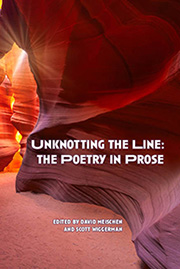
A haibun, but also includes
a prose poem, "Sanchez Dreamscapes"
|
|
Hunting in the Bosque
No guns, no arrows. You’re not out to kill anything. This hunt is entirely done through sight. You will need to flex your eyes, develop your ocular muscles, your depth perception. Be prepared to strain your neck backward, too. Yes, use binoculars if you must.
The best time to go is winter because the cottonwoods near the Rio Grande have lost their leaves: less camouflage, easier detection. Focus on the treetops. Yes, way up there. That clump that looks like an abandoned nest? Squint harder: this is what you’re looking for, a porcupine. It’s likely asleep, so may not move, its claws anchored to a branch that appears too thin for such a bundle. Yes, bigger than you think. A reason the French named them spiny pigs. Sometimes, you’ll spot one shift just a smidge, but if you’re lucky one may lumber into a crook.
After a while, the eyes adjust, and you will notice more porcupines with each hike, each in its own tree. You will wonder how you could have missed them on previous hikes. And if you need a souvenir, now is the time to look down. See the stripped bark at the tree’s base, clawed and gnawed in savage slashes? Proof the porcupine eases down at night to forage. Now search the perimeter out from the trunk. Here’s where, amidst the rotting leaves and scat on the forest floor, you might find a quill. This is your trophy.
art of the hunt
discovering
my feral side
|
|
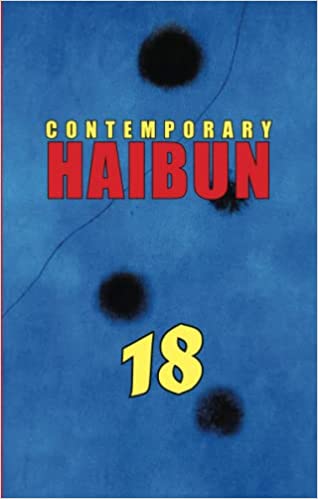
Selected as one of the best English-language
haibun published in the world in 2022!
|
|
To Get There
From the Plaza, take 64 west past the pueblo. Try not to get distracted by the moon expanding over Taos Mountain. At the Old Blinking Light Bar, turn left toward the indigo sunset. Just past the airport--three prop planes and a shard of landing strip--turn right onto an old dirt road. Drive slowly; the road is cratered as a pit mine. When you come to a ten-foot coyote fence that neither keeps anything in nor hold anything out, proceed to the second building, an adobe house behind the casita. Park, step out, face the house. The fading sun on your left, backlit mountains. The full moon on your right, like a holy wafer.
chiles knotted
into ristras
vows at dusk
|
|
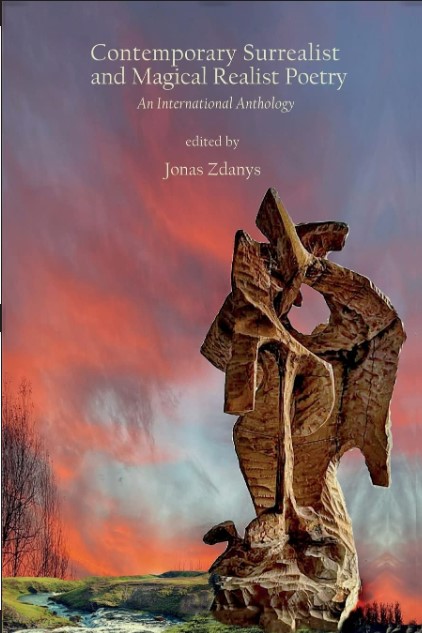
This major new anthology also includes
two other poems of mine, "Furled and Unfurled"
and the haibun "Shit Unhappens"!
|
|
Souvenir of Love
When heartstrings were matchbooks
and a bow moaned loud as a cocktail napkin,
scratched out calligraphic lettering
like huge Art Deco scar tissue.
When your quiet space reversed colors,
and the spotlight of anguish—a forked tongue,
the matches themselves—entered the stream,
a three-inch tall gravity all your own.
When the shocking black hole of grief
ensnared you like a 50¢ luncheon special,
a 75¢ dinner entrée, like red tadpoles
swimming in a double-sized cocktail.
A continental color scheme illuminated
five-pointed stars of red, black, and gold,
a crush of circles with a chef’s smiling face.
Celestial tipping was never permitted.
Then you accepted a gleaming white toque,
an upscale wild card from your sleeve,
a white-tablecloth restaurant only you
remembered, small as the world’s
expensive and expansive lies.
|
|
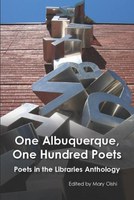
Another ghazal!
|
|
The Mystery of Grief
starting with a Dickinson line (#1084)
If all the griefs I am to have would only come today.
Let me play Job with punishment premium today.
Another war, another bomb, another police killing.
I take them on, my mind a crematorium today.
We live beneath a sword dangling by a single thread.
Are drugs the answer, or will you be doused in rum today?
Oh, vinegar and honey, I've cried so much I've lost my sight.
I try to speak of halcyon times, but I go dumb today.
Not proud of it, but I got used to living on a cross.
Let me take on your grief--I'm into martyrdom today.
Our sweet Silver disappeared a week ago without a trace.
The world has always been this random. Why so glum today?
Sorry business: what the Tiwi call their mourning period.
Don't leave me alone, or can't you stand this tedium today?
Why do you find it so hard to believe in bereavement?
I know grief is good--I wallowed in its medium today.
You'd like to ask God about loss, but that spirit has passed.
Have you prayed to find something lost? I found a crumb today.
|
|
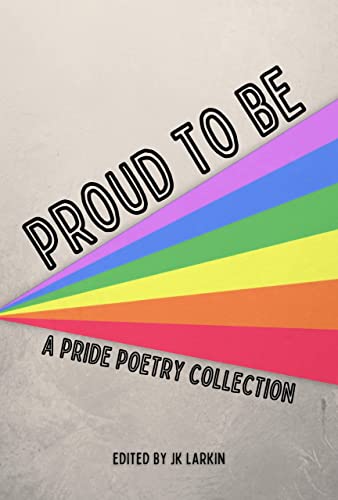
Includes four other poems
besides this duplex,
including a rare sci-fi one, "Long Kiss"
|
|
Resurrection
He calls me bear, a spirit animal
if you believe in such--not sure I can.
I don't believe in much. Not sure I can
follow the fetish of a dreamcatcher.
In dreams I fathom many a fetish.
I slither on the sheets like a rattlesnake.
I rattle when I anticipate his snake.
An ojo de díos opens on the bed.
A one-eyed oso, a god of the bed,
I growl as though awakening from winter.
I claw as though awakening with ghosts.
I rise with the hunger of months in a cave.
I rise hungry as Jesus three days in a cave.
He calls me bear, his spirit animal
|
|
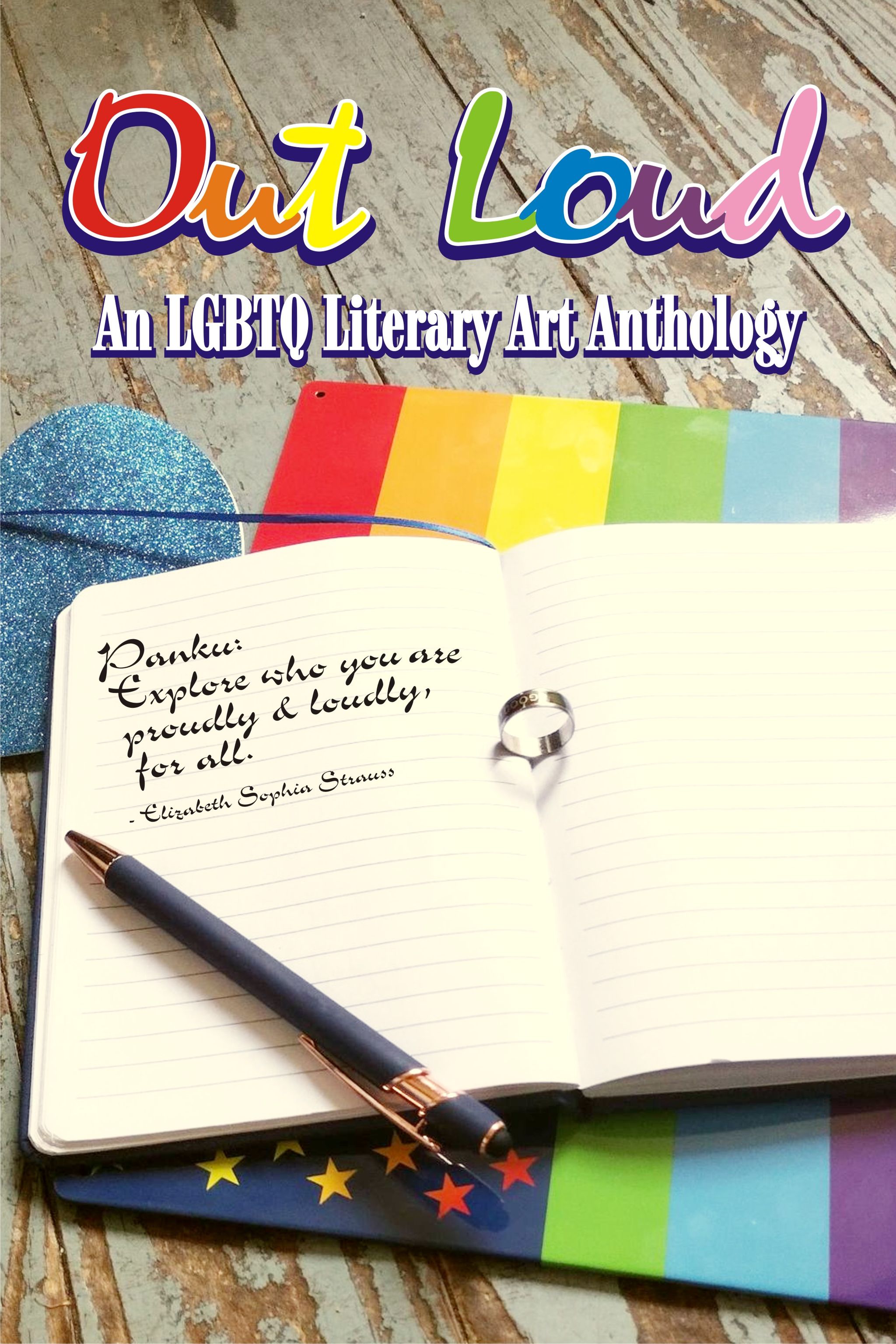
An excerpt from one of my
longer individual poems!
|
|
Last Rites (excerpt)
You would not have dreamt
of putting on shoes and socks without
a sprinkling of Gold Bond Foot Powder,
but there will never be sweat again.
I stretch black cotton socks
over craggy toes and splotchy ankles,
pulling them halfway up your hairless shins,
somehow not as dry as my own,
well above where my low-rise socks reach.
I place the right shoe, then the left,
the first pair I found that had some shine—
black Bass—and tie the laces
the only way I know how, bunny ears,
remembering the last time I did this,
you woozy on drugs from a colonoscopy.
As I drove home, you kept asking
How did these shoes get on? How?
That’s when a tear runs down my cheek.
|
|
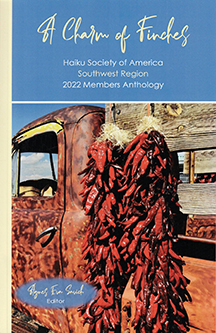
Includes three other haiku--
and one of my art prints!
|
|
cries of coyotes
during the Western
I hit pause
how far we are
from home
corn husk
|
|
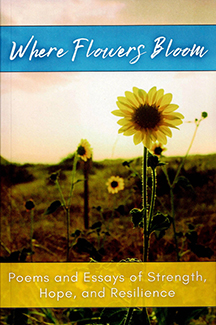
A sonnet celebrating the Ukrainian spirit!
|
|
Perennial
The daffodils bolt skyward, tiny limbs
of toddlers trying out the atmosphere,
though forecasts call for snow. Careless, the stems
relax in beds, hold back for warmer fare
to flower into yellow babble soon,
a brief commotion till real heat prevails.
For now, they’re fat and stumpy, stuck, while sun
and cold war back and forth—but growth reveals
the constant we believe will come each year:
renewal. Spits of snow arrive at last
and blanket. Poking through the thin layer,
thick tines of stalks—the proof the whole’s not lost.
Ukrainians, through flak and ash, embrace
this dream of seasons fusing all of us.
|
|
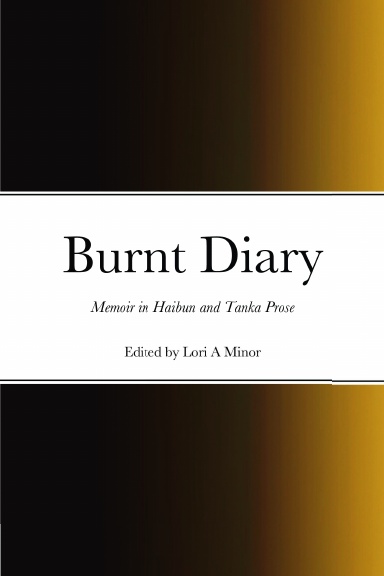
A haibun memoir anthology!
Also includes "But Who Will Take Care of You When You're Old?"
|
|
Awakening
I spent the summer of ’69 working in a dirty factory that manufactured metal parts. There were eight employees, and I was the only teenager. They liked to tease me for being too smart, too soft. When one of the burly guys laughed because I’d never been on a motorcycle, I gave in and let him take me for a ride. My arms around his chest, my crotch against his backside . . .
uneasy rider
the long, bumpy road
ahead
|
|
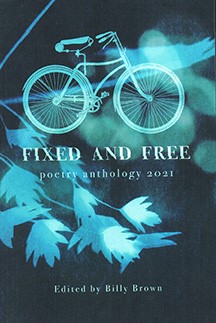
My section of a group poem written
with my fellow Prickly Peers, one of two in the anthology,
"Six Ways of Reading Eudora Welty"! This massive
anthology also includes my "Loneliest Place in America."
|
|
One More Time, Again and Again
My fingernails sink
into flesh, deep enough
for layers of you to lodge
and wedge there. I flick
and fleck your bits
under a microscope:
I see violence, violence--
black-and-blue shards,
purple contusions--
still no sign of tenderness.
How convinced I was
that under those thin
layers of onion skin,
I would reach the sweet
scent of hyacinths.
|
|
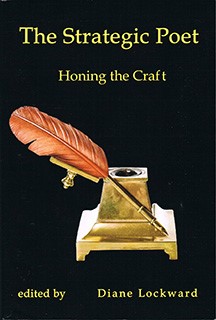
A one-sentence sonnet that's also a list poem!
|
|
Taming the Pieces: Collage
X-acto knife and extra blades, Mod Podge
for gluing, scissors, ruler, pencil and
eraser, stack of colored papers, wedge
of newsprint, mounting board; a steady hand,
an eye for texture, shape, design--and then
there's patience, willingness to make mistakes,
to alter, reconsider, scrap a plan,
to modify, experiment, unmake,
start over; toiling through a disarray
of colors; cut and move till suddenly
that spark of inspiration, Blessingway
toward realization, epiphany
creating harmony from chaos, cast
in human need for order--whole at last.
|
|
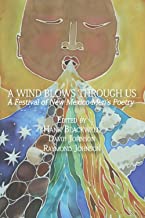
Also includes three other poems of mine,
"Meditation: New Mexico Backyard," "Balancing Act,"
and "Möbius."
|
|
Holding Off on the Day
Crickets, cicadas,
bugs banging at the screen door,
sounds that break the mesa's silence.
Cool night air not yet replaced
by heat that will press us to shut up
the house, attune our day
to the pulse of air conditioning.
This is the time of appreciation,
the morning sensed through closed eyes,
a time when the world enters
through two small chasms
and can be anything we imagine.
|
|
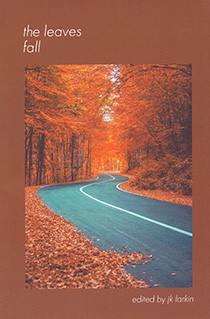
|
|
Falling Out of Summer
A month of Sundays,
a season too brief,
we touch with eyes closed,
our fingers sounding out hollows,
our mouths together, pressed
like pages of a book,
our tongues delving
through dog-eared memories.
In the foothills, fires
flare up, burn out,
their smoky imprint
burnished on our skin.
We peer out the window
at a certain stillness,
while days turn lonely
as truth.
|
|
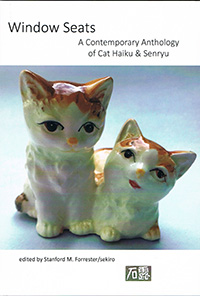
|
|
glints of daylight
on the cat's whiskers
the last nap
a howling
from the cat carrier
letting the vet know
|
|
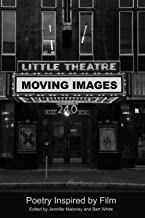
Also includes my haibun, "After Viewing
Our Lady of the Assassins."
|
|
Alaska
Does it matter that the moat
both widened and deepened,
that you left yourself no way out?
Or were you so wound up in creating legend
that you didn't see land as a tomb?
You insisted you could transcend
everyday struggles, refused to succumb
to the rules of the world--monies
and mortgages that left the mind numb,
the crowds and detritus of cities.
You found your space in the wild north,
miles from people, among tundra and trees,
foraging for survival in the undergrowth.
You discovered that peace is wed
to loneliness, and you shared this truth
with caribou and moose. Snow-clad
in the isolation of splendor,
you scratched out notes and dreamed of God,
the great indifference so like your
own, distant as a hoary star.
|
|
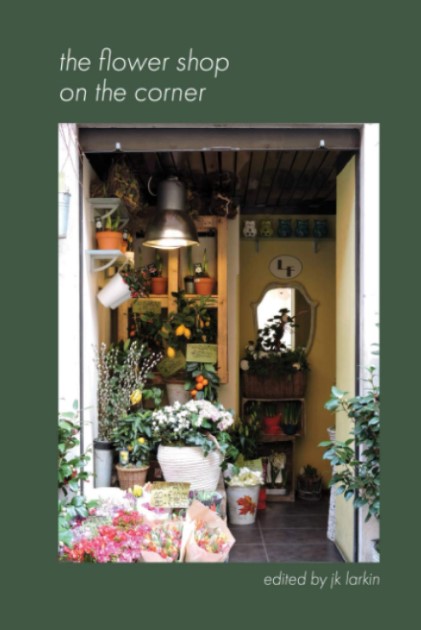
|
|
Meditation: New Mexico Backyard
The muted time as day begins. The cool.
The hummingbirds alone—but also wrens
and mourning doves, and unknown avians.
The bumblebees that shift like molecules.
The corkscrew willows, mountain juniper,
vanilla-scented ponderosa pines.
The coral yuccas, scarlet trumpet vines.
The mint that greens, fans out, overpowers.
The spines of cacti attracting light. The rocks
and paving stones that anchor paths and beds.
The filaments of spiders, things unsaid,
unseen. The timid bunny with white socks.
Give nature praise, and all the natural.
Exalt the morning. Laud the miracle.
|
|
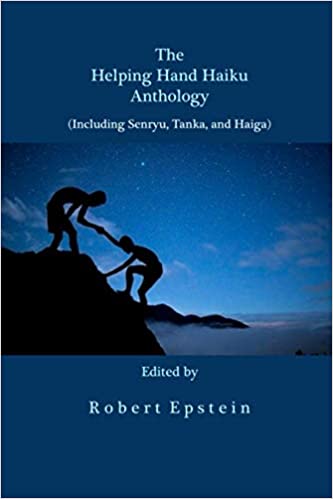
Includes three other haiku, as well.
|
|
purple glow
on the mountains
my parents hold hands
rosary beads
between his fingers
I hear the prayer
|
|
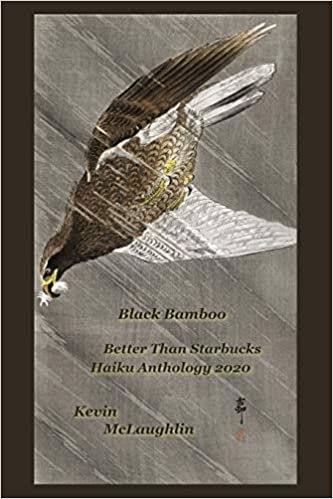
Includes two other haiku, as well.
|
|
measuring amounts
tablespoon by tablespoon
blood quantum
sudden flapping
a field of wildflowers
erupts from rest
|
|
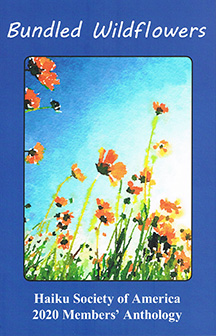
Annual anthology of the Haiku Society of America.
|
|
first day
with open windows
already a fly
|
|
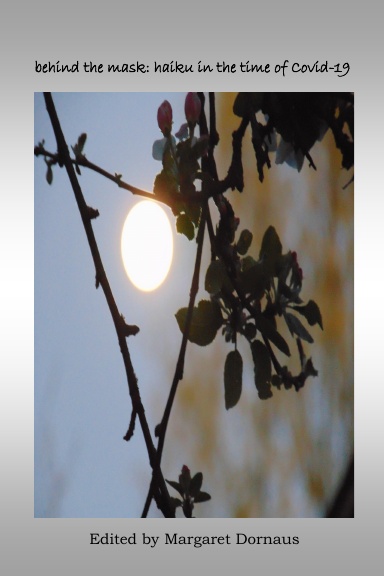
Includes one other haiku as well.
|
|
counting out
five syllables
coronavirus
daily death count . . .
wanting to believe it's all
fake news
|
|
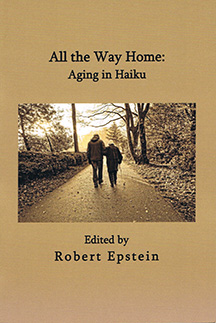
Includes three other haiku as well.
|
|
creaking vigas
in a Taos motel
dreams of old growth
flash of coyote
then a second dash--
another birthday
|
|

Includes all seven words banned by
the Trump administration.
|
|
To Beat the Banned
A gob of gel, a glob of goo,
too young to yet be a fetus.
I may always stay an embryo,
content with being a nucleus.
Too speculative, too vulnerable,
a bit of squiggle, a snick of squirm,
like many lives, I'm accidental,
the hook-up of an egg and sperm.
No male, not female, a touch
of both, which shouldn't be a crime.
I might be transgender in a clutch
and create my own paradigm.
A clot, a curd of diversity,
I add to myself each day.
I will be what I want to be,
not what conservatives say.
A spit of this, a spot of that,
afloat in this environment.
This hydroponic habitat
exists as my entitlement.
Facts are always evidence-based
or else they wouldn't be facts,
as science is always science-based--
or are these just means to distract?
|
|

|
|
French Lesson, Last Day of Summer Vacation
I never knew a tongue
could do such things.
I was in junior high.
The girl was younger but
more experienced than me.
All afternoon we sat
on her parents' front porch
making out like underwater explorers,
tongues descending through teeth,
around gums, into the caverns
of our adolescent mouths,
coming up only occasionally for air.
I never saw that girl after that
impromptu make-out session.
I don't recall anything about her
other than her name and her tongue:
Sherri with an i, not a y
like that falsettoed Four Seasons song
I hated, but which served for years
as a reminder of our own twist party.
I returned down the street to Grandma's,
older, for sure, wiser about Frenching,
but lingering under the surface
were still more depths to dive into,
deeper, lower.
|
|
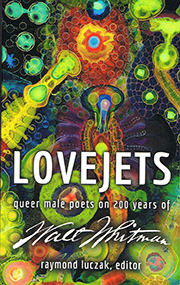
Includes two other poems as well,
"Hart Crane: A Cento" and "I Bequeath Myself"
|
|
Ghazal: Agha Shahid Ali to a Lover
beginning with a line from his poem "Of Light"
At dawn you leave. The river wears its skin of light.
I won't see you again, lost to the dull grin of light.
These bedsheets, redolent with a transitory warmth.
A fickle sky and clouds glaze in the paraffin of light.
A world away from the country of my birth,
lands that have outlived the thick and thin of light.
This is when I'm most alone, a tree rooted to pebbles.
The pelt of darkness vanishes in a coffin of light.
The taste of you flounders on the tip of my tongue.
Sweat and breathlessness squandered in the backspin of light.
Reflections slip like kite strings through my fallow hands.
Isn't this how memory dissolves--in a dustbin of light?
Home: a scribbling on the parchment of my Agha heart.
You are a fragment erased in the adrenaline of light.
|
|
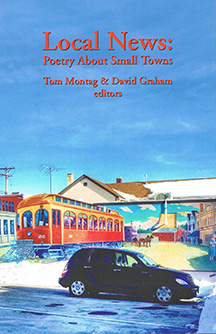
Also selected by Ted Kooser for March 2020's
"American Life in Poetry" (column 782)
|
|
Johnsburg
At the top of the hill, a towering
Catholic church with Gothic spires,
below, a one-pump gas station,
a beauty parlor with a picture window.
at the town's only four-way stop sign,
a convenience store with a bike stand,
and three smoke-drenched taverns,
their bars of the same solid wood
as the church's hard benches,
only more polished, more worn down.
|
|
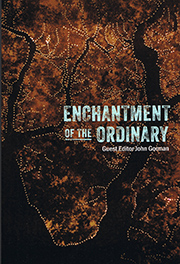
|
|
The Roadrunner
Fat as a rooster, a roadrunner
struts across the cinderblock fence,
stopping right where he's framed
inside the top of a metal trellis.
A leg goes up, scratches his neck
as a dog would scratch its ears.
Then, as if aware I'm watching,
he preens, his sharp beak lifting
in and out of belly and wings.
When he strains to reach his back,
his long tail feathers splay
like a dirty, damaged headdress.
Five minutes later he jumps down
to the garden, sorts through
compost under the rose bush,
shakes off like a wet mutt would.
Then back to the fence, back
to strutting and preening,
an encore performance,
as his head feathers crest
and recede with each bow,
a spectacular performance
for such a small audience.
|
|
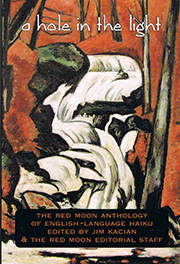
The Red Moon Anthology of English-Language Haiku
|
|
my shadow
the height and width
I always wanted
|
|
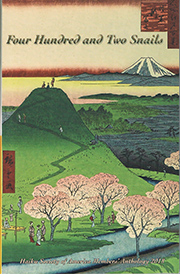
The anthology of the Haiku Society of America.
|
|
face in the cradle
of the old massage table
motionless spider
|
|
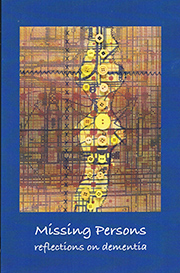
Includes the title poem of the collection,
"Missing Persons"
|
|
Gravity
I have watched
the white-braided woman
in the wheelchair
for half an hour.
Her head ticks downward,
slow as a minute hand,
so sluggish, it rests
at last on the table
without impact.
I saw the attendant
park her there,
pulll from a bin labeled Activities
an assortment of plastic blocks
in bright colors,
place her mottled hands
on the blocks as if she were
a child learning shapes and colors.
The hands slumped
off the table
once the attendant disappeared,
and the glacial slippage
of the head began,
quiet as time in this place
where people go wordlessly,
where no one hears
flesh meet wood
or registers the difference.
|
|
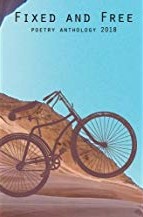
Includes two other poems as well,
"Welcome to My New Age" and "Garden Cameos"
|
|
Skies Over the East Mountains
Those contrails overhead--as if a child
had swiped a brush of white across the sky,
no thought to pattern nor design, just wild
strokes, straight and squiggly, carefree, low and high.
Some right to left, some up and down, some lost
and other crossed in X's, thin or thick
or bold or faint, a naïve art embossed
into the blue above. Then just as quick
the show is over, maneuvers complete,
and military jets return to base.
This is no play, but training, prep for war
performance pieces, smoke. Will soot delete
those chemical streaks, blot out skies, replace
our canvas, nudge us through that Doomsday door?
|
|
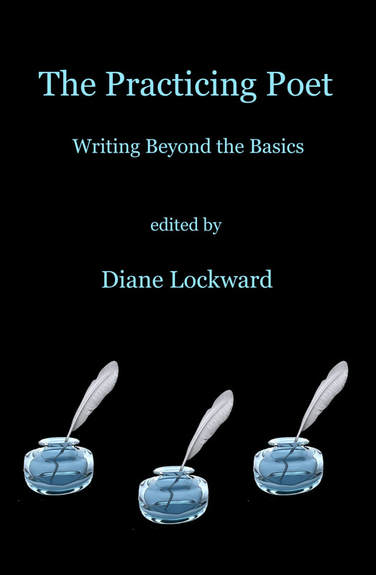
|
|
Territorial Rout
I think of my last meal. Thin as dust,
on the edge of my home, this frail mesa
I am weary, wary of the roads
bull-dozed through my land, wide houses
surging where mesquite and juniper
once provided cover. The jackrabbits
dwindle, move west, but how far, how far?
My eyes have yellowed, developed a far-
away glaze, barely noticing jackrabbits
arcing down arroyos. Age-old juniper
chainsawed to make room for a house,
or a view for a house, or another road--
humans, those who now claim this mesa.
My heart, my bones, my land scraped to dust.
|
|
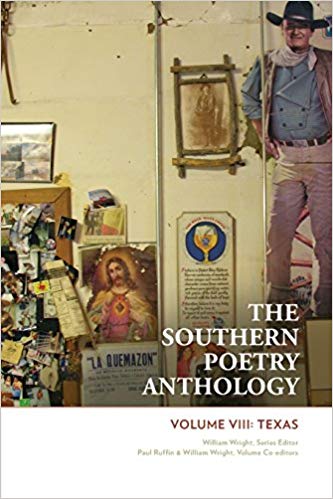
Includes two other poems as well,
"Love" and "Wintry Mix"
|
|
Formations
A quiet field of punctuation marks
becomes a murmuration: first, the lift,
despite a brutal wind, and then the shift
across the sky, from right to left in arcs
that sail in folds, a hundred wings as one,
apostrophes in sync, an aerial
display of feathers, beaks, and last, a pull
back down to earth, this sudden dance undone.
Our lungs inflate. Our breathing bellows cells
in movement: rising, falling. That's a fact.
My own heart murmurs, beats its wings the same
direction--over, over--casts its spells,
abandons them. And so . . . expand, contract:
it's how the world began, how we became.
|
|

Volume 5 of the "Poets Speak" Anthologies.
One of two golden shovels in the volume!
|
|
Twilight Time
a golden shovel incorporating a Dickinson line (#1738)
A good day for tears, for shadows that
skim adobe walls and leave us devastated,
for skies that offer thin condolences, for childhood's
amputated crayons, and the entire trying realm
of adolescence. We are stronger now, or so
we tell ourselves, but nothing's easy
as platitudes. How many years to go, to
outlive the damages we cannot repair?
|
|

Volume 4 of the "Poets Speak" Anthologies.
|
|
Some of Them Were Dreamers
a golden shovel incorporating an Issa haiku
Hard rain knocks blossoms
to earth. I watch at
a window till night
overruns the day, and
still no end to the
torrent's playlist. Border faces
peek from other windows: the dread of
isolation, the need for people
through the deluge. I have not moved,
immersed in blossoms mashed by
indifference, bled of all music.
|
|
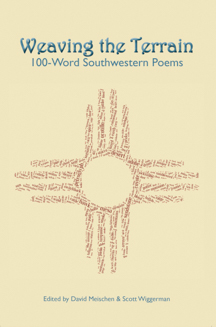
Edited by my husband and me!
|
|
Canyon at Kasha-Katuwe
Past bristling yuccas,
through the slot
where ponderosa subsist
on roots welded
to rock and
manzanita cleave to
crevices in cliffs,
millions of years
of geologic history
expose themselves in
pinks and grays,
russets and beiges,
striations that band
and curve like
desert snakes as
we squeeze through
narrow spaces between
walls of rock
and over shelves
that have shed
to the tapered
trail winding through
sun and shade--
despite grit in
our teeth, sand
in our shoes,
echoes in our
ears, our eyes
fixed to the
living shapes of
wind and heat
and water, never
a thought about us.
|
|
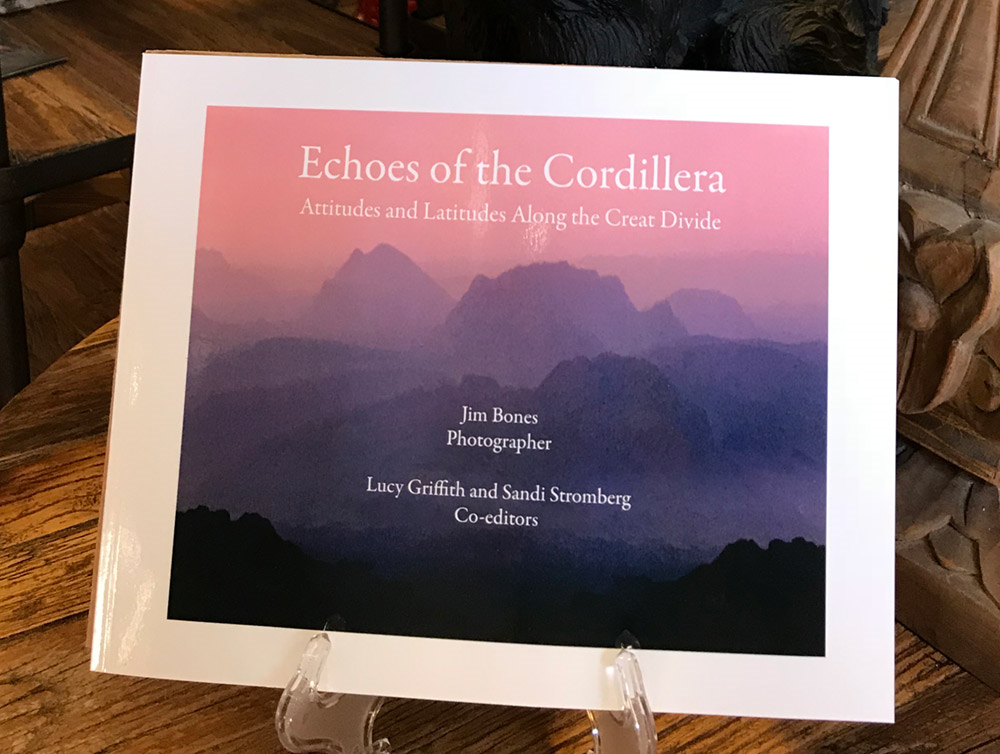
Written for the exhibit of the same name
for the Museum of the Big Bend.
|
|
Borrowed Earth
inspired by a Jim Bones' photograph
Sunlight tiptoes in, and sands sweep across the kiva.
We hear tumbleweeds dance and leap upon the kiva.
The sky is squandered here, and spider webs, invisible.
We breathe in dust, for rain does not weep into the kiva.
These earthen walls soothe, smack of smoke and bones.
Could we find true north from deep within the kiva?
Grains of maize rooted in the chamber's floor.
Ancestors honored: offerings to reap within the kiva.
Long ago, spirits cropped up from this dense dirt.
Rung by rung, the journey: steep, steep, up the kiva.
Overhead, a world of witches, walkers, and powders.
In the earth's belly, safe from their creep into the kiva.
Dreams are palpable here, silent and ancient as pelts.
How long have we been asleep inside the kiva?
|
|
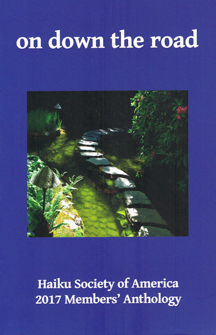
The anthology of the Haiku Society of America.
|
|
thin ice on the pond
how close I am
to breaking
|
|
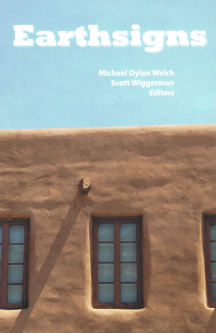
The anthology of Haiku North America 2017,
which I co-edited with Michael Dylan Welch!
|
|
mountain's outline
the difference walking
alone
|
|
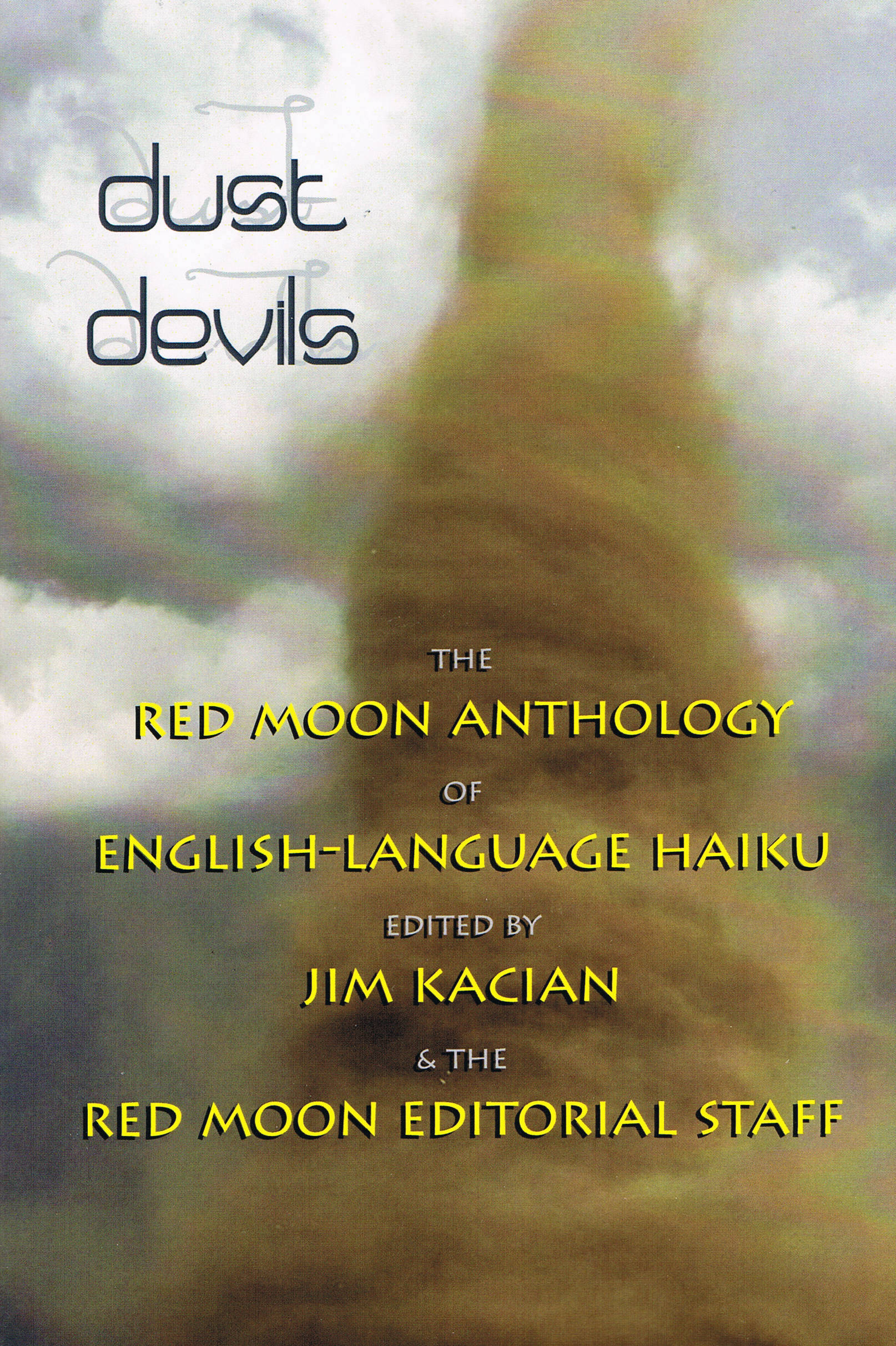
Annual volume of the best English-language
haiku in the world!
First printed in Modern Haiku
|
|
dog-eared page
where you stopped
loving me
|
|
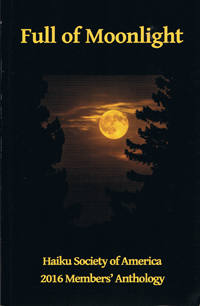
Reprinted from Chrysanthemum
|
|
impending buds
yellow with caution
we cross the border
|
|

My contribution to the
Festschrift for Wendy Barker
|
|
A Wet Winter Night
Isn't it always too much or too little?
Last summer, clouds would not stir.
Sun squeezed the honey from our bones.
Flowers stayed small, stems drooped.
The chickens finally stopped laying.
I sit still at a kitchen table
that smells of cheap lemon polish,
rub a sore finger that will not heal
across its fine-grained wood.
A thin rain pearls down the windows,
drips from house to garden.
Earth's open throat tries to keep pace.
The farm-to-market is likely under water.
The veneer of the sill is damp.
Drops pool on the floor: one . . . two.
I study reflections in the panes:
a green-lined vase with cut daffodils,
a plate of over-easy eggs,
their pale yellow yolks congealing.
I watch a rain that looks to never stop.
I know I'm missing something.
|
|
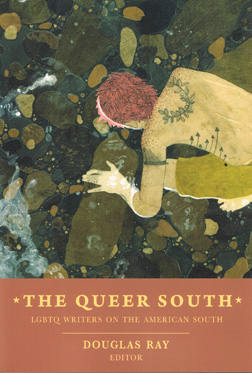
|
|
Postcard from West Texas
Freckles on his shoulders,
a wolf tattoo that peeks out
from torn-off shirt sleeves,
his hair long and red.
I say nothing to this stranger,
just watch the setting sun
glow in the motel courtyard,
his nimble fingers unpeeling
one longneck label after another.
Those rough nails, that tough glue.
It must be hours.
The sun tucks behind
the mountains, and the moon
appears all lost and sappy.
We must be drunk.
He howls when he stands.
My grin shines like a prayer.
|
|
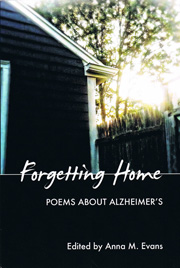
|
|
Missing Persons
That girl whose father
walked away from his family,
not to be heard from again:
I never thought of
my 95-year-old grandmother
as that girl,
but here she is,
conversing with him daily
until he turns
and walks off--again.
Through tears she asks,
Why would he do this?
I wasn't done talking!
She's confused
by his smooth skin,
his full head of hair--
It's like he doesn't age--
never mind that
eight decades have passed
since he became a ghost.
Last night he was supposed
to meet her at the drug store;
another day, the park.
Locations change,
but one thing is constant:
the turning away.
Rumor was he went west
and now that she's
in a home in Arizona,
she thinks she might find him.
She may be closer
than any of us
can see.
|
|

Proud to be among the many
fine poets whose poems appear
as samples in this new craft book!
|
|
Sonnenizio on a Willis Barnstone Line
The night is beautiful. I live alone
and listen to a lonesome howl beneath
a million lights. How could I be alone
when I'm alive, tuned to a Lone Star state
of mind? Some feel a loneliness out here,
my distant neighbor Malone, for instance,
who sits out front, a Lone Star in hand,
always alone, his fragile wife inside.
So he can leave his wife alone, nearby
a standalone refrigerator sits,
an exile on the porch, which I alone
witness. Malone does not appreciate
the night. A lone figure across the way--
is that how he sees me, alone and gray?
|
|
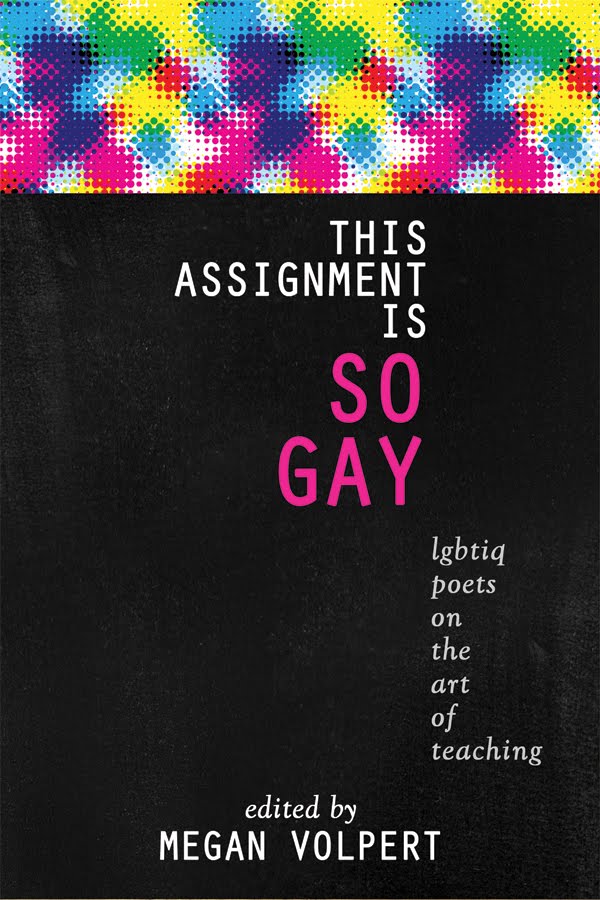
Also includes two other poems,
"Advocate" and "Teaching Tolerance"
|
|
Day of Silence
for the Gay-Straight Alliances
You think you know them, these students
who can't remember to bring a pencil to class
but somehow manage to find pink duct tape.
You told them their silence would be enough,
but they insisted on covering their mouths
with bright rectangles of sticky shocking pink.
The words of taped mouths can't be suppressed.
With eyes on fire, these gay and straight students
blaze down the halls, their message incinerating:
What are you going to do to end the silence?
|
|
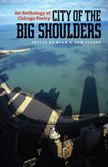
A paternal history
of my Chicago roots!
|
|
The Facts as I Know Them
Somewhere between Germany and Chicago,
Joseph Wiggermann lost an "n" at the end of his name.
But along the way he found a wife, Caroline Spauer,
and by 1884 they married, their traveling
thereafter confined to the edges of DuPage County.
Joseph was a blacksmith, a wheelwright,
a career well suited to an immigrant with limited English,
decent enough to provide for Caroline and the seven children,
six when Dominick succumbed in infancy to flu.
Caroline herself died eleven days short of forty-eight,
washing, cleaning, cooking, a workhorse to the end.
Ferdinand, the baby of the family, called Fred,
would become my father's father in 1934.
The Great Famine's shadow still lurked over Ireland
in the 1890s when Thomas McShea courted Catherine Ring.
Leaving the rocky glens of County Cork,
the McSheas sailed for what was still called the New Land
in a turn-of-the-century wave of Irish immigration.
They made their way, like the Wiggermanns before them,
to the city of Chicago, as good a place as any to be Irish.
Like many of his countrymen, Thomas joined the police,
but short of forty was shot in the line of duty,
the year before Capone moved to town,
ushering in a whole new era of gangster violence.
Thomas left behind his wife and three children,
Thomas, Jr., Vern, and little emerald-eyed Catherine,
who would become my father's mother in 1934.
For if I don't write it down, even less will remain.
|
|
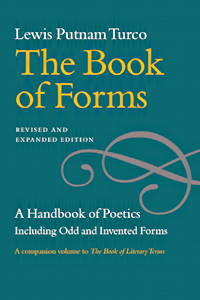
An updated & revised
edition of a classic!
I'm extremely proud to have
five poems in it: "Calm" (a cutaway),
"Cheap Oven Story" (a rabbet),
"Ghazal for the Leaf" (a ghazal),
"Laundry Room" (a fib), and
"Road Hazards" (a tritina).
|
|
Road Hazards
The two-lane highway is streaked with road kill
north of Lampasas, smeared with 'dillos and deer,
possums and rabbits, vultures that took too long
to relinquish a meal. Rain ushers in a long
afternoon of forsaken towns with nothing to kill
but time, their boarded-up storefronts and deer
processing shops sunk into ruin. Later, a deer
leaps from the darkness, its shiny eyes and long
legs challenging our cautious vehicle, a near kill.
To kill or be killed by deer, we long to make it home.
|
|
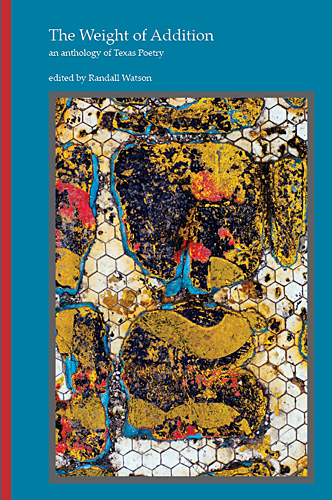
A fabulous
anthology of Texas poetry!
|
|
May
It is the month of bark,
the yard under the sycamore
a shipwreck of shavings
scattered randomly
against the shore of the deck;
the month of exfoliation,
strips of skin sloughed
to the ground in dried-up curls,
when the great tree
becomes blinding white again;
the month when death,
strewn about so beautifully,
can no longer ignore life,
leafing its secrets among the jumble,
the flotsam of mottled browns
and mossy greens,
the former brilliance in shades of gray,
textured with gnarls and knots,
layered like contour maps,
the wild and woody rinds at my feet.
|
       
  Comments greatly appreciated!
Comments greatly appreciated!  
|

![]()
![]() A n t h o l o g i e s
A n t h o l o g i e s ![]()
![]()
![]()
![]()
![]()
![]()
![]()
![]()
![]()
![]()
![]()
![]() Comments greatly appreciated!
Comments greatly appreciated! ![]()
![]()





























































